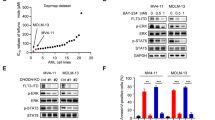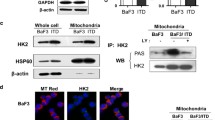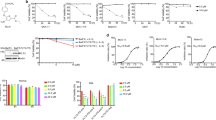Abstract
Treatment of FMS-like tyrosine kinase 3 (FLT3)-internal tandem duplication (ITD) AML is restricted due to toxicity, drug resistance and relapse eventhough targeted therapies are clinically available. Resveratrol with its multi-targeted nature is a promising chemopreventive remaining limitedly studied in FLT3-ITD AML regarding to ceramide metabolism. Here, its cytotoxic, cytostatic and apoptotic effects are investigated in combination with serine palmitoyltransferase (SPT), the first enzyme of de novo pathway of ceramide production, inhibitor myriocin on MOLM-13 and MV4-11 cells. We assessed dose-dependent cell viability, flow cytometric cell death and cell cycle profiles of resveratrol in combination with myriocin by MTT assay, annexin-V/PI staining and PI staining respectively. Resveratrol’s dose-dependent effect on SPT protein expression was also checked by western blot. Resveratrol decreased cell viability in a dose- dependent manner whereas myriocin did not affect cell proliferation effectively in both cell lines after 48h treatments. Although resveratrol induced both apoptosis and a significant S phase arrest in MV4-11 cells, it triggered apoptosis and non-significant S phase accumulation in MOLM-13 cells. Co-administrations reduced cell viability. Increased cytotoxic effect of co-treatments was further proved mechanistically through induction of apoptosis via phosphatidylserine relocalization. The cell cycle alteration in co-treatment was significant with an S phase arrest in MV4-11 cells, however, it was not effective on cell cycle progression of MOLM-13 cells. Resveratrol also increased SPT expression. Overall, modulation of SPT together with resveratrol might be the possible explanation for resveratrol’s action. It could be an integrative medicine for FLT3-ITD AML after investigating its detailed mechanism of action in relation to de novo pathway of ceramide production.






Similar content being viewed by others
Data availability
The manuscript has no associated data.
References
Adan A, Baran Y (2015) The pleiotropic effects of fisetin and hesperetin on human acute promyelocytic leukemia cells are mediated through apoptosis, cell cycle arrest, and alterations in signaling networks. Tumor Biol 36:8973–8984
Ambinder AJ, Levis M (2021) Potential targeting of FLT3 acute myeloid leukemia. Haematologica 106:671–681
Antar AI, Otrock ZK, Jabbour E, Mohty M, Bazarbachi A (2020) FLT3 inhibitors in acute myeloid leukemia: ten frequently asked questions. Leukemia 34:682–696
Bernhart E, Damm S, Wintersperger A, Nusshold C, Brunner AM et al (2015) Interference with distinct steps of sphingolipid synthesis and signaling attenuates proliferation of U87MG glioma cells. Biochem Pharmacol 96:119–130
Berretta M, Bignucolo A, Di FranciaComello RF, Facchini G, Ceccarelli M et al (2020) Resveratrol in cancer patients: from bench to bedside. Int J Mol Sci 21:2945
Bhaskara VK, Mittal B, Mysorekar VV, Amaresh N, Simal-Gandara J (2020) Resveratrol, cancer and cancer stem cells: a review on past to future. Curr Res Food Sci 3:284–295
Bhat VK, Bernhart E, Plastira I, Fan K, Ghaffari-Tabrizi-Wizsy N, Wadsack C et al (2019) Pharmacological inhibition of serine palmitoyl transferase and sphingosine kinase-1/-2 inhibits merkel cell carcinoma cell proliferation. J Invest Dermatol 139:807–817
Cakir Z, Saydam G, Sahin F, Baran Y (2011) The roles of bioactive sphingolipids in resveratrol-induced apoptosis in HL60: acute myeloid leukemia cells. J Cancer Res Clin Oncol 137:279–286
Chalfant CE, Rathman K, Pinkerman RL, Wood RE, Obeid LM, Ogretmen B, Hannun YA (2002) De novo ceramide regulates the alternative splicing of caspase 9 and Bcl-x in A549 lung adenocarcinoma cells. Dependence on protein phosphatase-1. J Biol Chem 277:12587–12595
Charytoniuk T, Harasim-Symbor E, Polak A, Drygalski K, Berk K, Chabowski A et al (2019) Influence of resveratrol on sphingolipid metabolism in hepatocellular carcinoma cells in lipid overload state. Anticancer Agents Med Chem 19:121–129
Choi KE, Jung YS, Kim DH, Song JK, Kim JY, Jung YY et al (2014) Myriocin induces apoptotic lung cancer cell death via activation of DR4 pathway. Arch Pharm Res 37:501–511
Chou TC (2008) Preclinical versus clinical drug combination studies. Leuk Lymphoma 49:2059–2080
Chow SE, Kao CH, Liu YT, Cheng ML, Yang YW, Huang YK, Hsu CC, Wang JS (2014) Resveratrol induced ER expansion and ER caspase-mediated apoptosis in human nasopharyngeal carcinoma cells. Apoptosis 19:527–541
Daver N, Schlenk RF, Russell NH, Levis MJ (2019) Targeting FLT3 mutations in AML: review of current knowledge and evidence. Leukemia 33:299–312
Dei Cas M, Ghidoni R (2018) Cancer prevention and therapy with polyphenols: sphingolipid-mediated mechanisms. Nutrients 10:940
Dolfini E, Roncoroni L, Dogliotti E, Sala G, Erba E, Sacchi N, Ghidoni R (2007) Resveratrol impairs the formation of MDA-MB-231 multicellular tumor spheroids concomitant with ceramide accumulation. Cancer Lett 249:143–147
Ha YN, Song S, Orlikova-Boyer B, Cerella C, Christov C, Kijjoa A, Diederich M (2020) Petromurin c induces protective autophagy and apoptosis in flt3-itd-positive aml: synergy with gilteritinib. Mar Drugs 18:57
Hannun YA, Obeid LM (2018) Sphingolipids and their metabolism in physiology and disease. Nat Rev Mol Cell Biol 19:175–191
Huang XT, Li X, Xie ML, Huang Z, Huang YX, Wu GX et al (2019) Resveratrol: review on its discovery, anti-leukemia effects and pharmacokinetics. Chem Biol Interact 306:29–38
Kisková T, Kassayová M (2019) Resveratrol action on lipid metabolism in cancer. Int J Mol Sci 20:2704
Ko JH, Sethi G, Um JY, Shanmugam MK, Arfuso F, Kumar AP, Bishayee A, Ahn KS (2017) The role of resveratrol in cancer therapy. Int J Mol Sci 18:2589
Kojima T, Asano Y, Kurasawa O, Hirata Y, Iwamura N, Wong TT et al (2018) Discovery of novel serine palmitoyltransferase inhibitors as cancer therapeutic agents. Bioorg Med Chem 26:2452–2465
Lee YS, Choi KM, Choi MH, Ji SY, Lee S, Sin DM et al (2011) Serine palmitoyltransferase inhibitor myriocin induces growth inhibition of B16F10 melanoma cells through G2/M phase arrest. Cell Prolif 44:320–329
Lee YS, Choi KM, Lee S, Sin DM, Lim Y, Lee YM et al (2012) Myriocin, a serine palmitoyltransferase inhibitor, suppresses tumor growth in a murine melanoma model by inhibiting de novo sphingolipid synthesis. Cancer Biol Ther 13:92–100
Lim KG, Gray AI, Pyne S, Pyne NJ (2012) Resveratrol dimers are novel sphingosine kinase 1 inhibitors and affect sphingosine kinase 1 expression and cancer cell growth and survival. Br J Pharmacol 166:1605–1616
Lin YS, Hsieh CY, Kuo TT, Lin CC, Lin CY, Sher YP (2020) Resveratrol-mediated ADAM9 degradation decreases cancer progression and provides synergistic effects in combination with chemotherapy. Am J Cancer Res 10:3828–3837
Lindblad O, Li T, Su X, Sun J, Kabir NN, Levander F, Zhao H, Lu G, Rönnstrand L, Kazi JU (2015) BEX1 acts as a tumor suppressor in acute myeloid leukemia. Oncotarget 6:21395–21405
Meng J, Liu GJ, Song JY, Chen L, Wang AH, Gao XX, Wang ZJ (2019) Preliminary results indicate resveratrol affects proliferation and apoptosis of leukemia cells by regulating PTEN/PI3K/AKT pathway. Eur Rev Med Pharmacol Sci 23:4285–4292
Mizutani N, Omori Y, Kawamoto Y, Sobue S, Ichihara M, Suzuki M et al (2016) Resveratrol-induced transcriptional up-regulation of ASMase (SMPD1) of human leukemia and cancer cells. Biochem Biophys Res Commun 470:851–856
Nganga R, Oleinik N, Ogretmen B (2018) Mechanisms of ceramide-dependent cancer cell death. Adv Cancer Res 140:1–25
Ogretmen B (2018) Sphingolipid metabolism in cancer signalling and therapy. Nat Rev Cancer 18:33–50
Oğuz O, Adan A (2021) Involvement of sphingolipid metabolism enzymes in resveratrol-mediated cytotoxicity in philadelphia-positive acute lymphoblastic leukemia. Nutr Cancer. https://doi.org/10.1080/01635581.2021.2005806
Opydo-Chanek M, Rak A, Cierniak A, Mazur L (2017) Combination of ABT-737 and resveratrol enhances DNA damage and apoptosis in human T-cell acute lymphoblastic leukemia MOLT-4 cells. Toxicol In Vitro 42:38–46
Razumovskaya E, Sun J, Rönnstrand L (2011) Inhibition of MEK5 by BIX02188 induces apoptosis in cells expressing the oncogenic mutant FLT3-ITD. Biochem Biophys Res Commun 412:307–312
Sano O, Kazetani KI, Adachi R, Kurasawa O, Kawamoto T, Iwata H (2017) Using a biologically annotated library to analyze the anticancer mechanism of serine palmitoyl transferase (SPT) inhibitors. FEBS Open Bio 7:495–503
Scarlatti F, Sala G, Somenzi G, Signorelli P, Sacchi N, Ghidoni R (2003) Resveratrol induces growth inhibition and apoptosis in metastatic breast cancer cells via de novo ceramide signaling. FASEB J 17:2339–2341
Scarlatti F, Sala G, Ricci C, Maioli C, Milani F, Minella M, Botturi M, Ghidoni R (2007) Resveratrol sensitization of DU145 prostate cancer cells to ionizing radiation is associated to ceramide increase. Cancer Lett 253:124–130
Scholl S, Fleischmann M, Schnetzke U, Heidel FH (2020) Molecular mechanisms of resistance to FLT3 inhibitors in acute myeloid leukemia: ongoing challenges and future treatments. Cells 9:2493
Shaw J, Costa-Pinheiro P, Patterson L, Drews K, Spiegel S, Kester M (2018) Novel sphingolipid-based cancer therapeutics in the personalized medicine era. Adv Cancer Res 140:327–366
Siedlecka-Kroplewska K, Wozniak M, Kmiec Z (2019) The wine polyphenol resveratrol modulates autophagy and induces apoptosis in MOLT-4 and HL-60 human leukemia cells. J Physiol Pharmacol. https://doi.org/10.26402/jpp.2019.6.02
Ulrich S, Huwiler A, Loitsch S, Schmidt H, Stein JM (2007) De novo ceramide biosynthesis is associated with resveratrol-induced inhibition of ornithine decarboxylase activity. Biochem Pharmacol 74:281–289
Yaguchi M, Shibata S, Satomi Y, Hirayama M, Adachi R, Asano Y et al (2017) Antitumor activity of a novel and orally available inhibitor of serine palmitoyltransferase. Biochem Biophys Res Commun 484:493–500
Nur Şebnem, Ersöz Aysun, Adan (2022) Resveratrol triggers anti-proliferative and apoptotic effects in FLT3-ITD-positive acute myeloid leukemia cells via inhibiting ceramide catabolism enzymes. Medical Oncology 39(3) https://doi.org/10.1007/s12032-021-01627-2
Acknowledgements
The authors acknowledge Genome and Stem Cell Center of Erciyes University for providing the flow cytometry facility. We are grateful to Esma Saraymen, the specialist, for flow cytometry measurements.
Funding
This study was supported by Abdullah Gul University Scientific Research Projects Coordination Unit with Project No: FAB-2016-66.
Author information
Authors and Affiliations
Contributions
Conceptualization: AA; Acquisition, analysis or interpretation of data: NŞE, AA; Writing - review and editing: NŞE, AA; Approval of the final version: NŞE, AA; Supervision and principal author: AA.
Corresponding author
Ethics declarations
Conflict of interest
The authors have no conflicts of interest to declare that are relevant to the content of this article.
Ethics approval
Not applicable.
Consent to participate
Not applicable.
Additional information
Publisher’s Note
Springer Nature remains neutral with regard to jurisdictional claims in published maps and institutional affiliations.
Rights and permissions
About this article
Cite this article
Ersöz, N.Ş., Adan, A. Differential in vitro anti-leukemic activity of resveratrol combined with serine palmitoyltransferase inhibitor myriocin in FMS-like tyrosine kinase 3-internal tandem duplication (FLT3-ITD) carrying AML cells. Cytotechnology 74, 271–281 (2022). https://doi.org/10.1007/s10616-022-00527-1
Received:
Accepted:
Published:
Issue Date:
DOI: https://doi.org/10.1007/s10616-022-00527-1




